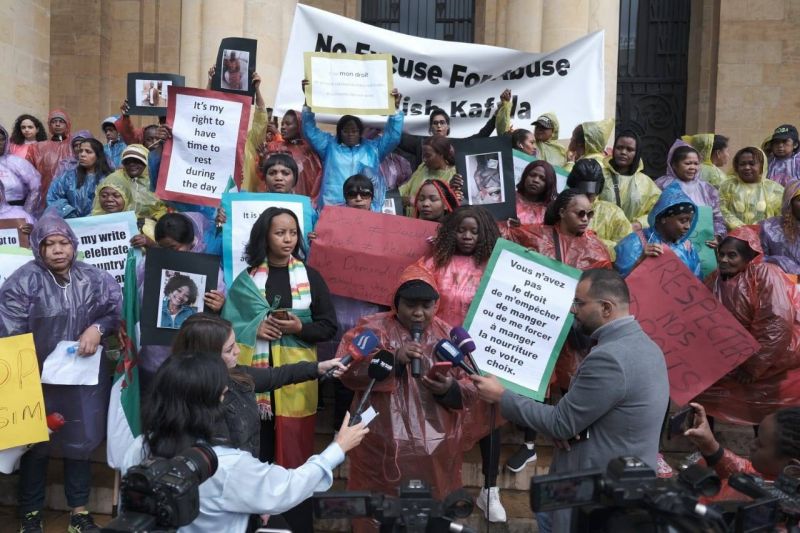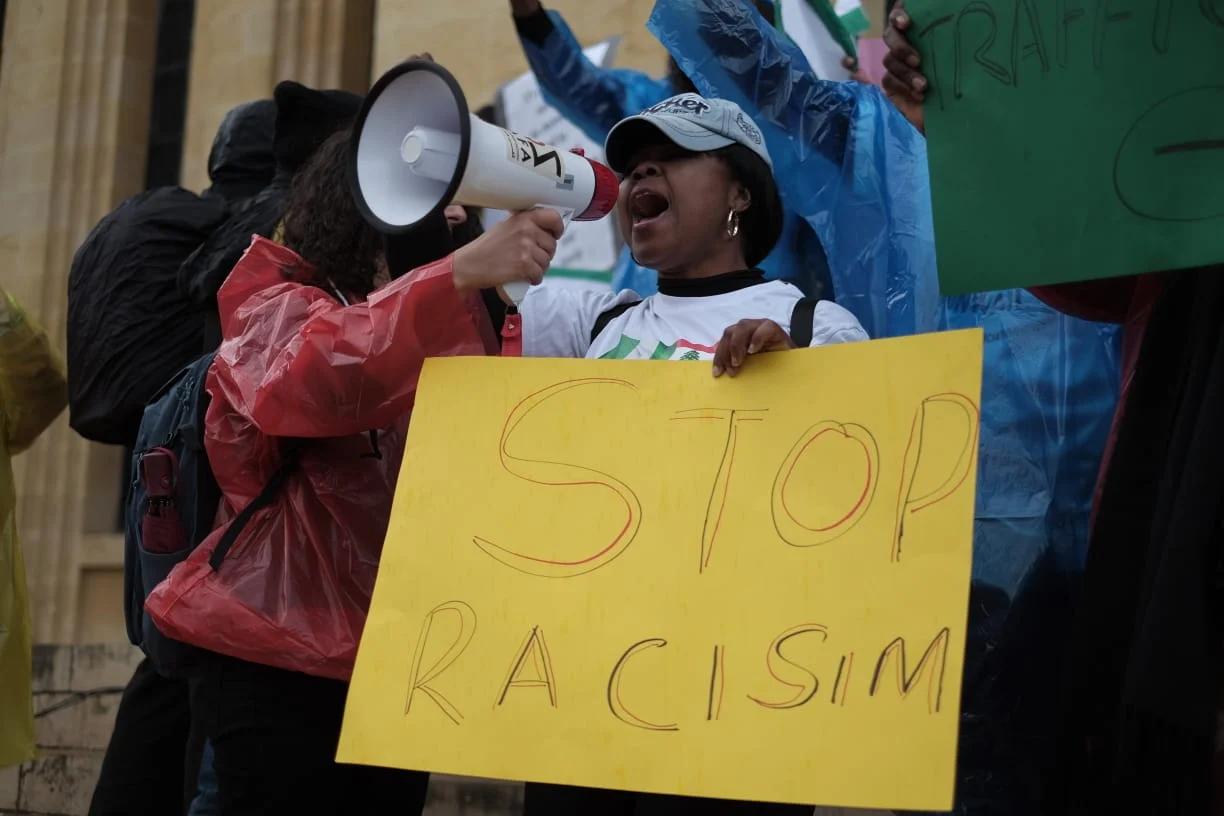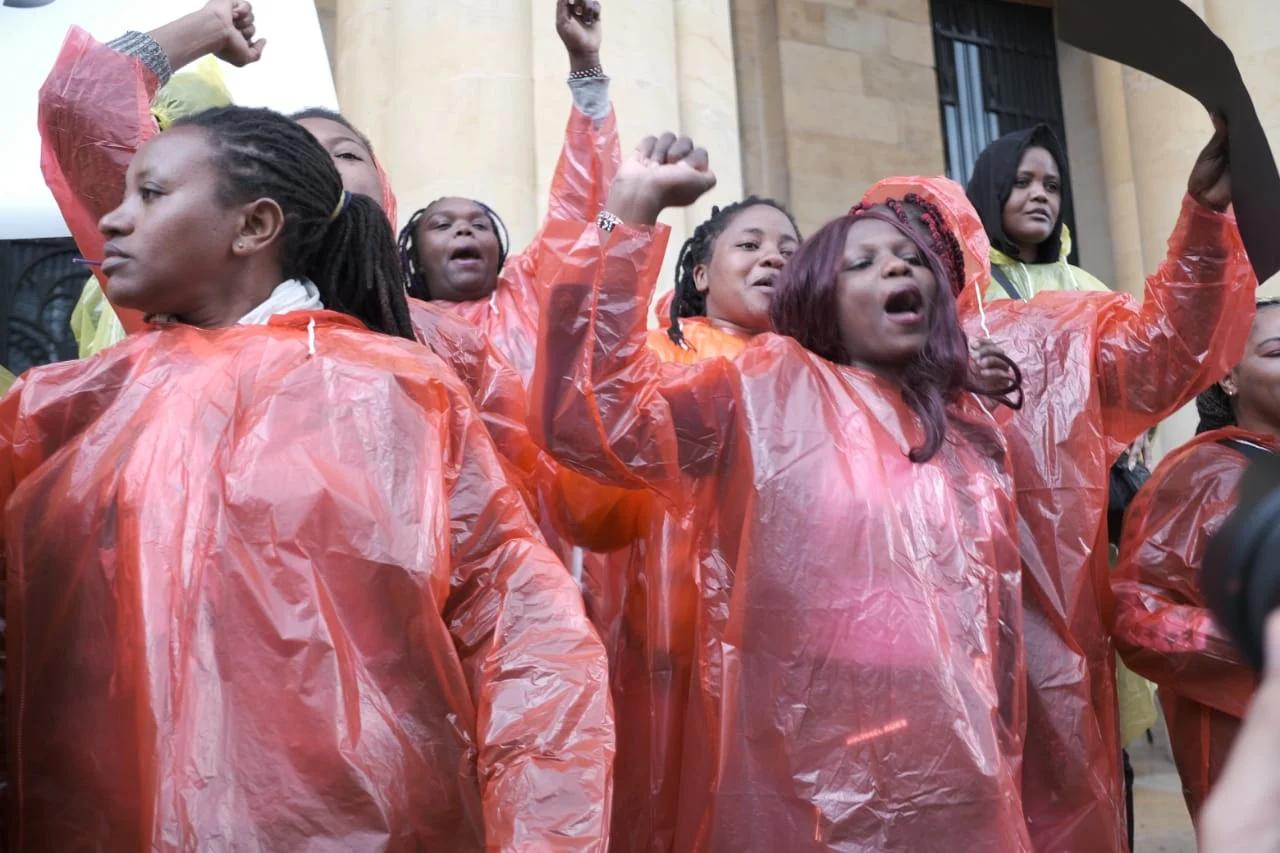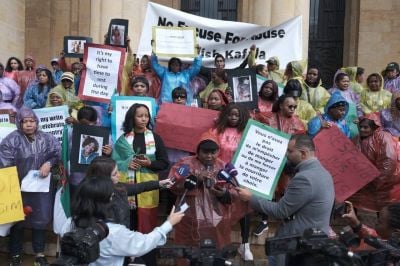
A domestic worker gives a speech during a demonstration in front of Beirut's National Museum, April 29, 2023. (Credit: João Sousa/L'Orient Today)
BEIRUT — In the rain, wrapped in colorful k-ways, about 200 women demonstrated in front of the National Museum in Beirut Saturday. Gathering shortly after 4 p.m., these migrant domestic workers protested against the violence they suffer in Lebanon.
"Abolish kafala!" and "Domestic work is a job" could be read on signs held aloft by these women, citizens of Sri Lanka, Bangladesh and a number of African countries.
 A demonstrator speaks during the National Museum event. (Credit: João Sousa/L'Orient Today)
A demonstrator speaks during the National Museum event. (Credit: João Sousa/L'Orient Today)
"Regardless what Lebanon is going through, there is no excuse for abuse and violence," said a domestic worker in a speech delivered in English — and repeated by two other women in French and Arabic. They denounced the "system of servitude" that is kafala, a sponsorship system without safeguards guaranteeing freedom of movement, the right to breaks and free time, and without the possibility of terminating the work contract with one month's notice without incurring financial penalties.
'We are treated like subhumans!'
The demonstration was organized two days before Labor Day, a public holiday in Lebanon.
"We are here to get freedom," said Mercy Peter, a 27-year-old Nigerian woman who has lived in the country for seven years.
"Our children are not allowed to go to school and with the crisis, we have no work. We are asking for a minimum of $5 dollars an hour," she continued, claiming to be paid LL170,000 at the moment — less than two dollars at the current market rate.
The demonstration was calm, but Agnes, 38, who came to Lebanon from Cameroon in 2014, voiced her anger. "We are treated like subhumans!" she declared, saying she is a "prisoner" in Lebanon. "We are demonstrating to be recognized as workers."
Fewer employees, just as many abuses
This demonstration is the first in three years, said several women on the spot. It was the initiative of the workers themselves, with the support of tw0 Lebanese associations, Kafa (Enough violence and exploitation) and Amel.
"We have grown up here. We have grown old here. And we have founded families here. So we want rights here," said Anna Fernando, a 52-year-old Sri Lankan worker who has been living in Lebanon for 35 years.
Rana el-Andari, a member of the Kafa association, pointed out that "the number of female migrant workers in Lebanon has decreased with the crisis, but this has not improved the conditions of those who have stayed."
The reason, she said is the kafala system, which "gives the employer all the rights" over these women.
 Women demonstrate against domestic workers' working conditions in Lebanon, adjacent Beirut's National Museum, April 29, 2023. (Credit: João Sousa/L'Orient Today)
Women demonstrate against domestic workers' working conditions in Lebanon, adjacent Beirut's National Museum, April 29, 2023. (Credit: João Sousa/L'Orient Today)
In Lebanon, migrant domestic workers are excluded from the labor law and are completely dependent on their employers. They are exposed to all kinds of abuse. The kafala system also makes foreign domestic workers vulnerable to abuse, including being deprived of the right to sue their employers in case of mistreatment and withholding their wages.
Since the economic crisis, the Covid-19 pandemic, and the Beirut port blast of August 4, 2020, many female migrant workers have left the country.
Some departed of their own free will due to the impoverishment of the Lebanese middle class and the scarcity of foreign currency. Others left after being abandoned by their employers at the doors of embassies. In the absence of official figures, it is thought that Lebanon still employs 250,000 migrant domestic workers. While there are a number of men in the sector, it is mainly a female job.
Dozens of domestic workers from Sierra Leone gathered in front of their country's consulate on March 13, to shout their anger after four of their compatriots died in a fire at their home in Sad al-Bauchrieh, in the eastern suburbs of Beirut.
"Justice for our sisters," they shouted unanimously on that day, "We are treated like slaves," "We want to go home," "We are not safe here."

